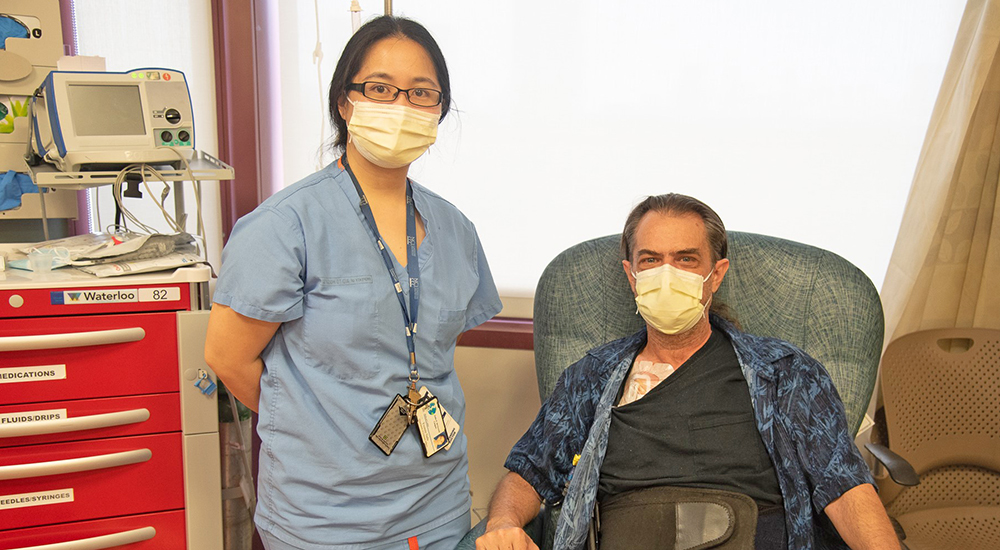Veteran Greg Kelso, who served in the Navy from 1991 to 1995 aboard USS Abraham Lincoln, was working as a dispatcher with the Humble Police Department in Texas when he was diagnosed with stage four colorectal cancer at the age of 37.
For the past 13 years (and last eight receiving care at the Michael E. DeBakey VA Medical Center’s Cancer Center), Kelso has battled and beaten cancer three times. Oncologist Dr. Yvonne Sada (pictured above with Kelso) has cared for him since he first arrived at VA, and Kelso says she puts the needs of the patient first.
“Dr. Sada listens to the patients,” he recalled. “She listens to me with what my body is saying because chemo can really put a strain on you. Sometimes I feel I can’t go in for a session because it’s too much and I think she understands that.”
Kelso is once again in the fight for his life after being diagnosed a fourth time. “I refuse to give up or give in,” said Kelso, who has written three books and runs a Comic-Con podcast.
Veterans show tremendous bravery in fight against cancer
“Veterans show tremendous resilience and bravery in their fight against cancer. It is a privilege to go on this difficult journey with our patients and their families,” said Sada, who is also an assistant professor in Medicine-Hematology & Oncology at Baylor College of Medicine. “Our wonderful team of medical staff, infusion nurses, palliative care specialists, psychologists, social workers and dietitians works closely together to provide the multi-disciplinary support our patients deserve.”
Get screened for colorectal cancer
Each year, VA diagnoses 4,000 new cases of colorectal cancer in Veterans.
Colorectal cancer doesn’t care about race, gender or economic status. If you are 45 to 75 years old, you need colorectal screening. The most common screening is a colonoscopy every 10 years. Other options include a home-based fecal immunochemical test that checks for blood in the stool.
“Most colorectal cancers can be prevented or detected early with standard screening,” said Sada, who is board certified in both oncology and internal medicine. “If a patient ever has concerns about their risk of cancer or symptoms, they should always discuss this with their doctor because colon cancer can happen at any age.
“If a patient is worried about a colonoscopy or having a hard time with the home stool test, they need to talk to their providers so that we can help overcome any barriers. We strongly recommend that all patients have cancer screening done because these tests save lives.”
Kelso, now 50, is grateful for VA. “The doctors and infusion nurses are wonderful,” he added. “They really do care about everybody. You can just tell by the way they treat people. If someone asks for something, they’ll get it the best that they can. They always check up on people. They ask when you get there if you need anything.”
Topics in this story
More Stories
Today is a great day to play ball and do some yoga! Take 10 minutes to enjoy a full-body yoga routine on a fitness ball.
Caregiving can be a deeply rewarding journey, but it also can be overwhelming and isolating. That’s why support and connection can make all the difference.
The slopes of the Winter Sports Clinic help Veterans with disabilities remember that pushing boundaries—and not their limitations—is what defines them.





